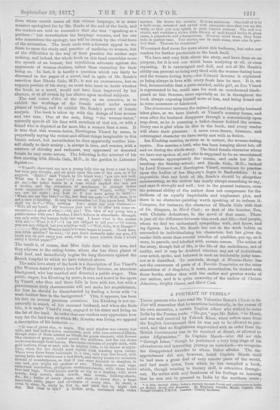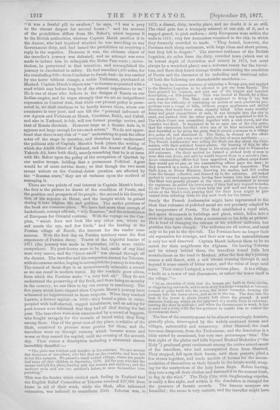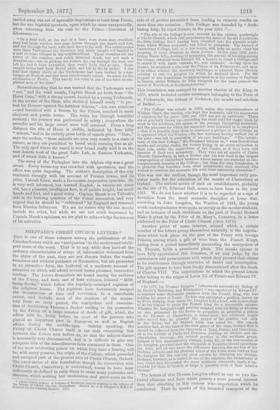A PORTRAIT OF PERSIA.*
THOSE persons who have read Mr. Valentine Baker's Con* in theEast will remember that he mentions incidentally, in the course of his own narrative, a certain English officer who wished to enter India by the Persian route. " He got," says Mr. Baker, "to Herat, and was well received by Yakoob Khan, when orders came from the English Government that he was not to be allowed to pro- ceed, and that no Englishman unprovided with an order from the- British Government Was to be received at Herat, or allowed to enter Affghanieten." In Captain Marsh—who did not ride "through Islam," though he performed a very long stage of his adventurous and interesting journey on horseback—we recognise the disappointed traveller to whom Baker alludes. The dis- appointment did not, however, befall Captain Marsh until: be had seen a great deal of very remote parts of the world, and had made notes, from which he has compiled a book, which, though wanting in literary skill, is attractive through- out. Ile writes with naV frankness of his feelings on learning that he was not to proceed to India by the northern route ;.
* A Ride through Islam being a Journey through Persia and Afghanistan to India, via Meshed, Herat, and Kandahar. By IIippialey Cuollfre Marsh, Captain 18111 Bengal Cavalry, F.B.G,E3. London: Tinsley Brothers. 44 it was a fearful pill to swallow," he says, "I was a prey to the utmost despair for several hours ; " and hie account of the prohibition differs from Mr. Baker's, which imputes it to the British authorities, whereas Captain Marsh ascribes it to the Ameer, who had inquired whether he was travelling on any Government duty, and had issued the prohibition on receiving a reply in the negative. However it was, the ultimate object of the traveller's journey was defeated, and an attempt was even made to induce him to relinquish the Bolan Pass route ; never- theless, he persevered in that intention, and accomplished the journey to Jacobabad in safety. He had travelled 1,680 miles, for the concluding 900—from Candahar to Jacobobad—he was carried by one horse without change, a noble Turkoman, purchased at Meshed. Captain Marsh's object was "to become acquainted with a road which may before long be of the utmost importance to us." He is one of those who believe in the designs of Russia on our Indian empire, and he urges strongly that we are an insignificant expression in Central Asia, that while our present policy is perse- vered in, we shall continue to be hardly known there, where our commerce is very poor, and not till the "personal influence of our Agents and Politicals at IIerat, Candahar, Balkh, and Cabul, and also in Yarkund, is felt, will our former prestige revive, and that of Russia diminish. However large as a theatre Asia is, it appears not large enough for two such actors." We do not appre- hend that there is any risk of "our" undertaking to push the other actor off the stage in question, and therefore leave undiscussed the political side of Captain Marsh's book (since the writing of which the Atalik Ghazi of Yarkund, and the Ameer of Kashgar, Yakoob Ali, have both died), merely remarking that he is at issue with Mr. Baker upon the policy of the occupation of Quettah by our native troops, holding that a permanent Political Agent would be of more service there ; so that though the two most recent writers on the Central-Asian question are affected by the "Russian scare," they are at variance upon the method of managing it.
There are two points of real interest in Captain Marsh's book ;
the first is the picture he draws of the condition of Persia, and the position and prospects of its people ; the second is his descrip- tion of his sojourn at Herat, and the insight which he gained during it into Afghan life and politics. The earlier portions of the book are common-place. We have had more than enough of backsheesh, corrupt officials, "wily Russians," and the substitution of European for Oriental costume. With the voyage on the Cas- pian, "which does not look like any other sea, where no sail meets the eye, and few birds," and the landing at the Persian village of Enzeli, the interest for the reader com- mences. With the first day on Persian territory same the first 'experience of Persian decay. Traces of the frightful famine of 1871 (the journey was made in September, 1872) were visible 'everywhere. No post-horses were to be had, cattle of any kind were very scarce, and the " fever-smell " was abroad through all the district. The traveller and his companion started for Teheran, with six caravan-mules, hoping to accomplish the journey in ten days. The record of those days is as monotonously miserable a record as we can recall in modern travel. By the roadside grow olives, from which the Persians make "a very bad oil." They do not understand the preserving of the fruit, and there being no security in the country, no one likes to lay out money in machinery. The five years which have elapsed since Captain Marsh's journey have witnessed no improvement in these respects. When they reached Laswin, a former capital—in 1600—they found a place in ruins, peopled with half-starved, ragged inhabitants, and on asking for post-horses were informed that they bad all died during the last year. The travellers were soon surrounded by a crowd of beggars, who fought savagely for the morsels of bread which they flung among them. One of the great men of the place, a relative of the Shah, contrived to procure some ponies for them, and the travellers went on through country which became worse and worse as they neared the capital, until the evening of the seventh day. Then comes a description including a statement almost incredibly dreadful :— " The plain was treeless and desolate in the extreme: We saw several
where who e had the
dry skeletons of travellers, who had died on the roadside, and boon left to rot like animals. We pulsed a small walled villagthe,e
men er le had eaten all their children in September, 1870. All means had left the place,leavIng only the women and children ; and the mothers stole and fate one another's babes, to save themselves from perishing."
This was the famine which excited such feeling in England that the English Relief Committee at Teheran received £27,000 from home in aid of their work, while the Shah, after reiterated entreaties, was induced to contribute 1300. Teheran was, in
1872, a dismal, dirty, tawdry place, and no doubt it is so still. The chief gate has a trumpery minaret at one side of it, and a ragged guard, in pink uniform ; sixty Europeans were within the walls in 1872 ; very few Armenians remained in the city, to which they formerly crowded to trade. " They found, however, the Persians such sharp customers, with large ideas and short purses, that they left in despair." The summer residence of the British Legation, six miles from the dirty, crowded town (which was at its lowest depth of desolation and misery in 1872, but must always be a wretched place) was a welcome resort for the travel- lers, and there they heard strange truths concerning the condition of Persia and the character of its unfeeling and irrational ruler. Of both the following are characteristic anecdotes :- 'I One day be became desirous of obtaining a Krupp gun, and applied to the Russian Legation to be allowed to got one from Russia. The Czar granted his request, and sent one of the largest and heaviest description —a 300-pounder. This was landed at Enzeli, by a Rus- sian man-of-war. The Shah sent a regiment to bring it up, but such was the difficulty of convoying an article of such ponderous pro- portions over a range of bills, without proper appliances and skilf reT direction, that brute force alone signally failed. After many months' delay and great expenditure of men, it was brought into the city in state, and parked with the other guns and a day appointed to fire it. The whole Court was assembled, together with a vast crowd, and the monster was fired. It happened to be so near one of the city gates, that the concussion knocked down one of its blue minarets, and the shot travelled so far along the plain that it struck a mosque in a village five miles off, and shattered it. The Shah, in dismay at the effect produced, had it put away out of sight, for fear of more accidents The French Ambassador was tolling the Shah one day about the Cuir- assiers, with their polished breast-plates. On hearing of this, he also wanted to have a regiment of them in his army, and sent to France for 500 cuirasses. On their arrival be formed a picked body of men to wear this cool dress, and said he would inspect them in a month's time. As no commanding officer had been appointed, this gallant corps knew they would got no pay, as the commanding officer pays the men ; so they deserted in a mass, a few days before the regal inspection. The Sudr Azan, or Prime Minister' knowing his master, had 500 coolies from the bazaar collected, and dressed up in the euirassea. All looked perfect to outward appearance, having been beaten into lino and order. The Shah was greatly pleased at the show, and, determined to mount the regiment, he asked his breve army if they bad any request to make. To the Wuzeor's horror, the whole body ran poll moll and throw them- selves at the Shah's feat, praying that the Sudr Azan might be pre- vented from enlisting them for any such work for the future."
Surely the French Ambassador might have represented to the Shah that cuirasses of polished metal are not precisely adapted to
the temperature of Persia. The Shah established a royal mint, and spent thousands in buildings and plant, which, fallen into a state of decay and rust, form a monument to his folly at present. He is fond of changing the colours of his soldiers' uniforms, but gratifies this taste cheaply. The uniforms are all cotton, and need
only to be put in the dye-tub. The Persians have no longer their old reputation for courage, and their new one for untruthfulness is only too well deserved. Captain Marsh believes them to be no match for their neighbours the Afghans. On leaving Teheran and its misery behind them, the travellers found little but
wretchedness on the road to Meshed. After the first day's journey comes a salt desert, with a salt stream running through it, and
beyond it some canals of bitter water, and the ruins of large mud forts. Then comes Lashgird, a very curious place. It is a village, " built on a tower of vast dimensions, or rather the tower itself is the village
"At an elevation of sixty feet thee houses are built in three stories, or rings facing outwards, and to each story is a large verandah or balcony, formed of poles built into the tenor, the lower verandah forming the passage into the house above, and so on to the top. The door into the base of the tower is about twenty feet above the ground. A mud staircase leads up, which on the approach of a hostile force is cut away, leaving the door in mid-air ; and when the Government is weak, it has to send out a force with the tax-gatherer to enable him to collect the Government dues."
The face of the country seems to be almost unvaryingly desolate, gravelly plain, interrupted by the widely-scattered towns and villages, unbeautiful and unsavoury. After Sharood, the road becomes dangerous, from the Turkomans ; and the desolation is a little varied by occasional, but very rare picturesque bits.' The first sight of the plains and hills beyond Meshed Mukudus (" the Holy") produced great excitement among the native armed escort of the travellers, who had accompanied them from Sharoocl. They stopped, fell upon their knees, said their prayers, piled a few stones together, and made models of houses for the accom- modation of themselves or their friends in the futute world, weep- ing for the martyrdom of the holy Iman Raya. Before leaving, they tore a rag off their clothes and fastened it to the nearest bush, to flap in the wind." The Holy City, with its glistening cupolas, is really a fine sight, and within it the desolation is changed for the presence of fanatic crowds. The famous mosques are beautiful ; the scene is very curious, and the traveller might have
carried away one set of agreeable impressions at least from Persia, but for one frightful spectacle, upon which he came unexpectedly, when returning from his visit to the Prince - Governor of Khorassan :—
" On a dead wall, at the end of a lane, wore throe men crucified ; they had largo wooden tent-pegs driven through the hands and feet, and one through the back, with their faces to the wall. The unfortunates were three Turkomans the Governor had lately caught red-handed in a raid on some villages in the neighbourhood. These wretches are the terror of the country, and richly deserved death, but not such a dreadful ono; for, to prolong the torture, the peg through the back was left in; bad it boon extracted, they would have died at once. Some caught before had been flayed alive, and loft to die by inches. I was told that eighty chiefs of the Turkomans had been invited to a con- ference at Meshed, end had been treacherously Euized. So much for the eivilisatiou of Persia. This was by the order of one of the most accom- plished men of his time."
Notwithstanding that he was warned that the Turkomans were "out," and the road unsafe, Captain Marsh set forth from "the Herat Gate," with a strong escort, headed by a young Turko man, in the service of the Shah, who declared himself ready "to pro- tect his Honour against the faithless thieves,"—his own relations —and furnished with a firman by the Prince, couched in most eloquent and poetic terms. The route lay through beautiful country; the journey was performed in safety ; everywhere the traveller and his large escort were well received. From a long distance the Bite of Herat is visible, indicated by four lofty 44 minars," and in its vicinity great herds of camels graze. "Here," says the author, "these animals are seen very nearly in a state of nature, as they are permitted to breed while roaming free as air. The only spot where the camel is now found really wild is on the vast deserts west of the great Lake Lob, in Eastern Turkestan, and of which little is known."
The entry of the Feringliee into the Afghan city was a great event. Every house-top was crowded with spectators, and the effect was quite imposing. The author's description of the city Contrasts strongly with his account of Persian towns, and its ruler, Yakoob Khan, made a favourable impression uponhim. He is very well informed, has learned English, is twenty-eix years old, has a pleasant, intelligent face, is of middle height, has small hands and feet, and a good voice. Captain Marsh is on Yakoob's side in the burning question of the Cabul succession, and very urgent that he ehould be " cultivated " by England and removed from Russian influences. We see no reason why the one should include the other, but while we are not much impressed by Captain Marsh's opinions, we are glad to acknowledge the interest of his narrative.




































 Previous page
Previous page